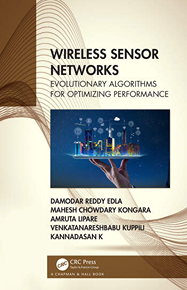Wireless Sensor Networks Evolutionary Algorithms for Optimizing Performance
Material type: TextLanguage: English Publication details: Boca Raton, Fl : CRC Press, c2021 Edition: 1stDescription: XII, 134 p. : illISBN:
TextLanguage: English Publication details: Boca Raton, Fl : CRC Press, c2021 Edition: 1stDescription: XII, 134 p. : illISBN: - 9780367342418
- 681.2 EDL
| Item type | Current library | Collection | Shelving location | Call number | Copy number | Status | Date due | Barcode |
|---|---|---|---|---|---|---|---|---|
 Lending Collection
Lending Collection
|
Circulation Section | Department of Telecommunications Engineering | Circulation Section | 681.2 EDL | 2022-23 | Available | 97864 |
Biography
Dr. Damodar Reddy Edla is an Assistant Professsor in the Department of Computer Science and Engineering at National Institute of Technology Goa, India. He received M.Sc. Degree from the University of Hyderabad in 2006, M.Tech. in Computer Application and Ph. D. Degree in Computer Science and Engineering from Indian School
of Mines Dhanbad in 2009 and 2013 respectively. His research interests include Cognitive Neuroscience, Data Mining, Wireless Sensor Networks and Brain-Computer Interface. He has published more than 100 research articles in reputed journals and international conferences. He is the senior member of IEEE and IACSIT. He
is also Editorial Board member of several international journals.
Mahesh Chowdary Kongara received the B.Tech. Degree in Computer Science and Engineering from Sree
Vidyanikethan Engineering College, Tirupati, Andhra Pradesh and the M.Tech. Degree in Department of Computer Science and Engineering from National Institute of Technology Goa, India in 2017. He is currently a Full-Time Research Scholar with the Department of Computer Science and Engineering, National Institute of Technology
Goa. His research interests include Soft Computing, Wireless Sensor Networks, Internet of Things.
Amruta Lipare has received the B.Tech. Degree in Information Technology from Rajarambapu Institute of Technology, Sakharale, Maharashtra, in 2015, and the M.Tech. Degree in Computer Science and Engineering from National Institute of Technology, Goa, in 2017. She is currently a Full-Time Research Scholar with the Department of Computer Science and Engineering, National Institute of Technology Goa. India. Her research interest includes Soft Computing, Wireless Sensor Networks, Evolutionary Computations and Swarm Intelligence.
Dr. Venkatanareshbabu Kuppili, Ph D (IIT Delhi), is with the Machine Learning Group, Department of CSE, NIT Goa, India, where he is currently an Assistant Professor. He was with Evalueserve pvt. ltd, as a Senior Research Associate. He is also actively involved in teaching and research development for the Graduate Program in
Computer Science and Engineering Department at the NIT Goa. He has authored several research papers published in reputed International journals and conferences. He is senior member of IEEE.
Kannadasan has completed his B.Tech in Information Technology at SASTRA University, Tamilnadu and M.Tech in Computer Science and Engineering, National Institute of Technology, Goa. Currently, he is pursuing his PhD degree in National Institute of Technology, Tiruchirappalli. He is student member in IEEE and Secretary at IEEE Student branch, NIT Tiruchirappalli. His research interests include Machine Learning, Wireless Sensor Networks, Swarm optimization techniques, Brain-Computer Interface etc.
summary:
Wireless Sensor Networks: Evolutionary Algorithms for Optimizing Performance provides an integrative overview of bio-inspired algorithms and their applications in the area of Wireless Sensor Networks (WSN). Along with the usage of the WSN, the number of risks and challenges occurs while deploying any WSN. Therefore, to defeat these challenges some of the bio-inspired algorithms are applied and discussed in this book.
Discussion includes a broad, integrated perspective on various challenges and issues in WSN and also impact of bio-inspired algorithms on the lifetime of the WSN. It creates interdisciplinary theory, concepts, definitions, models and findings involved in WSN and Bio-inspired algorithms making it an essential guide and reference. It includes various WSN examples making the book accessible to a broader interdisciplinary readership.
The book offers comprehensive coverage of the most essential topics, including:
Evolutionary algorithms
Swarm intelligence
Hybrid algorithms
Energy efficiency in WSN
Load balancing of gateways
Localization
Clustering and routing
Designing fitness functions according to the issues in WSN.
The book explains about practices of shuffled complex evolution algorithm, shuffled frog leaping algorithm, particle swarm optimization and dolphin swarm optimization to defeat various challenges in WSN. The author elucidates how we must transform our thinking, illuminating the benefits and opportunities offered by bio-inspired approaches to innovation and learning in the area of WSN. This book serves as a reference book for scientific investigators who shows an interest in evolutionary computation and swarm intelligence as well as issues and challenges in WSN.
